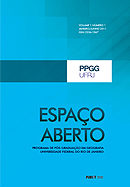Agro-environmental Sustainability of the Yuanyang Rice Terraces of Yunnan Province, China
DOI:
https://doi.org/10.36403/espacoaberto.2014.2433Palavras-chave:
atitudes culturais, povo de minoria Hani, paisagem de multifuncionalidade, otimização de recursos, Yuanyang, China.Resumo
O povo de minoria Hani, da Província de Yunnan (sudoeste da China) desenvolveu um sistema complexo e sustentável agro-ambiental de arroz, plantado em terraços em Yuanyang ( 22°49'-23°19'N, 102°27-103°13'E). O povo de Hani tem mantido esse sistema intrincado e elaborado por mais de 1.300 anos, com aproximadamente 3.000 terraços cobrindo uma área de 11.000 hectares. Desta forma, durante a Dinastia Ming (1368-1644), o imperador deu ao povo de Hani o título de "Escultores da Montanha Mágica" por terem construído essas escadas para o céu. No entanto, o isolamento geográfico e a proximidade da então fronteira politicamente sensível, levou com que os terraços de Yuanyang tenha atraído a atenção científica. Se podemos compreender como esse sistema tem sido sustentável, podemos aprender lições as quais podem ser aplicadas de forma mais genérica.


